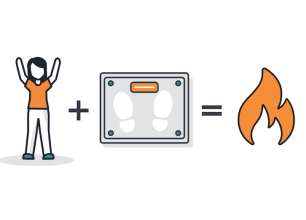Why lifestyle change vs. fad diets and exercises?
Fad diets and exercises (along with other gimmicky weight loss strategies) are often seen as a “magic bullet” to losing weight and improving health issues, but there is mixed evidence to support this claim.
Focusing instead on long-term lifestyle change is proven to help you achieve your wellness goals and improve your day-to-day well-being.
The truth about fad diets
While research suggests that some fad diets—such as the Ketogenic, Paleolithic, and Atkins diets—may produce weight loss in certain people, there are several drawbacks to them.
For example, fad diets typically restrict the consumption of key nutrients that your body needs to function. This can lead to loss of muscle and bone density, fatigue, and vitamin deficiencies.
Most importantly, the research is clear that fad diets are unsustainable due to their unrealistic and restrictive rules. In other words, the stricter your diet, the harder it is to follow it. You will likely burn out quickly and even gain back any weight you may have lost.
In fact, one study conducted by UCLA researchers and published in American Psychologist found that 83% of people who dieted gained back more weight than they lost within two years.
The truth about fad exercises
Like fad diets, fad exercise routines can be difficult to sustain and are often not scientifically studied. In many cases, fitness fads rapidly gain popularity through marketing rather than sound evidence.
Fad exercise equipment like the ThighMaster, Shake Weight, and Sketchers Shape Ups, for example, was widely sold for a brief time before fading in popularity because there simply was no evidence to back them up.
In general, it is important to remember the difference between an exercise trend and an exercise fad. While a fad is usually “gimmicky” and lacks evidence, exercise trends are popular because the research shows that they are effective.
Why don’t fad diets and exercises work?
One key feature all these fads share that makes them unsuccessful is that they are too short-sighted. These methods prioritize achieving weight loss as fast as possible with little concern for your health and well-being in the long term.
This all-or-nothing mindset can also be harmful to both your physical and mental health. Rapidly gaining and losing weight causes significant wear and tear on your body that can increase your risk of diabetes and mortality.
In addition, intense diets can harm your emotional well-being and cause you to have a negative relationship with food.
The reality is that it takes time to cultivate safe, sustainable habits that help you lose weight and eat better in the long run. This means that there very rarely is a “magic bullet” solution.
Why lifestyle change vs. fad diets and exercises
Fad diets and exercises are often ineffective and can be damaging to your health, but that doesn’t mean you’re out of options.
A comprehensive review of lifestyle modification approaches to weight loss found that long-term lifestyle change is a much safer, more effective, and more sustainable means of losing weight compared to short-lived diet and exercising.
Changing your approach from quick fixes to gradual lifestyle changes can also make a tremendous difference in your health outcomes beyond just losing weight. This includes reducing your risk of heart disease, type II diabetes, joint injuries, and all-cause mortality. In addition, you will learn to cultivate a more positive mindset toward your health, your body image, and the food that you eat.
How to change your lifestyle
First, keep in mind the definition of a lifestyle. Your lifestyle is your typical way of life. This includes all your daily habits, from how physically active you are each day to how much sleep you get each night.
That said, your lifestyle encompasses much more than just diet and exercise. And since you’ve likely had certain lifestyle habits for a long time, changing or replacing them with healthier habits will take time as well.
The good news is, just because lifestyle change takes time, it doesn’t mean that it’s too hard. In fact, you may find that it’s actually much easier than a fad diet or exercise.
Instead of pushing yourself to adopt vastly different behaviors overnight, the best way to start changing your lifestyle is to make small, incremental changes to the habits that you already practice every day.
For example, if you tend to eat takeout frequently, the first step is to set a goal to simply eat at home more times than you eat out each week. This goal is much more achievable than deciding from day one to never eat takeout again!
The key to this strategy is moderation, or finding a balance between two behavioral extremes. So, instead of either eating takeout every day, or never eating takeout again, the end result should be a balance between eating healthy, home-cooked meals regularly with the occasional restaurant or drive-thru meal.
Once you are comfortable maintaining small lifestyle changes such as the above, you can slowly begin to incorporate new goals that you want to achieve. These can include drinking more water, practicing mindfulness, and/or going for walks in nature, for example.
It’s easy to emphasize habits that promote only physical and emotional well-being. However, there are many more domains of health and wellness that require moderation to build a healthy lifestyle. This is why Prescribe FIT defines a healthy lifestyle to include ALL domains of life:
“The commitment in mindset and practice to a balanced way of living which includes consistent habits that promote personal well-being and fulfillment in all domains of life and that proactively reduce the risk of illness, pain, or hardship.”
To learn more about this definition, as well as many more examples of healthy lifestyle changes, visit our blog “11 Healthy Tips to Transform your Lifestyle”
Framing your lifestyle changes
Notice that all the goals listed above frame change in terms of adopting positive behaviors, rather than avoiding unwanted behaviors. This is an important distinction!
Research has found that “approach-oriented” goals (e.g., “eating at home more”) are much more successful than “avoidance-oriented” goals (e.g., “never eating takeout again”). This is because you are encouraging yourself to practice behaviors that support your health—and enjoying the benefits in the process—rather than simply avoiding behaviors that may not be the best for your health.
Approach-oriented goals can also serve as an alternative to less healthy behaviors. They are also associated with better self-esteem, more happiness, and less stress. Next time you set a goal for yourself, try to frame it as an approach-oriented goal rather than an avoidance-oriented one!
More tips for success
Finally, a great way to help you make healthy lifestyle changes is to seek support from family, friends, a health coach, and/or a medical provider. Several studies suggest that counseling is a key component of successful lifestyle change, especially when offered by a medical professional.
In fact, one study from Duke University found that patients who received counseling from a medical provider or clinical staff member over a year lost an average of 7 pounds more than patients who received no counseling.
Enter: Prescribe FIT! Prescribe FIT extends orthopedic care beyond in-office visits through our evidence-based lifestyle program. We help you improve you health at home by addressing your lifestyle choices, which are often the root cause of common knee, hip, ankle, back, and joint conditions.
Conclusion
Lifestyle change is a proven method of improving your health, losing weight, and preventing chronic disease. Fad diets and exercises, however, are often ineffective. They can even end up causing more harm than good to both your body and mind.
Fortunately, changing your lifestyle habits doesn’t have to be difficult. The key is to start slow and steady, focusing on the easiest changes you can make to improve your health. And don’t forget, seeking counseling can offer you additional support, motivation, and education.
Soon enough, all those easy changes in your daily life will become a healthy lifestyle in which you can enjoy your fullest physical, mental, and emotional well-being!
Published on January 17, 2023

